翻译句子竞赛版
精读2翻译句子考卷版
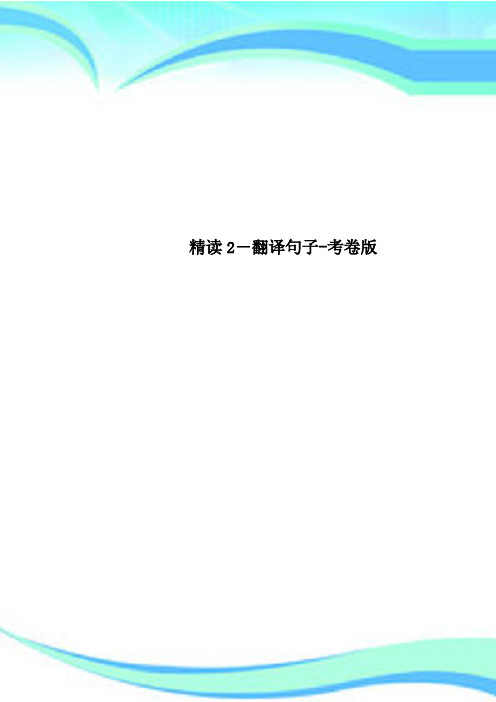
精读2-翻译句子-考卷版————————————————————————————————作者: ————————————————————————————————日期:ﻩ1.我们像在暖房里种花那样养孩子是错误的。
我们必须让他们接触各种社会问题,因为不久他们就将作为公民来应对这些问题。
2.随着时间的推移,我们不可避免地会越来越多地卷入国际事务。
而冲突必然会发生,因为国家之间总有不同的观点和利益。
3.我们为我们的成就而骄傲,我们有理由感到骄傲。
但是我们永远不能变得狂妄,不然我们就会失去我们的朋友。
4.信息现在唾手可得。
一个普通的电脑就能储存一个普通图书馆的信息。
5.那家建筑公司没有资格操作这个项目。
他们没有任何法律文件能证明他们具备必要的专门技术。
我们必须找一个专门建造歌剧院的公司。
6.这些智囊团不作决策。
他们力图提出一些对决策者十分有用的新主意和深刻的分析。
7.国内生产总值不是一切。
如果人民的生活质量没有真正改善的话,我们国家就不能说已经现代化了。
8.虽然那时候我们在很多方面都很困难,但作为孩子我们仍然很幸福,因为有干净的空气、水;江河湖泊里有很多鱼、螃蟹、黄鳝;田野里有花,有树,有鸟。
9.只要给某一个人或某一群人以绝对权力,那这个人或这一群人就肯定会滥用权力,因为正如阿克顿勋爵所说,“权利使人腐败,绝对权力绝对使人腐败。
”10.在我们国家,传统上都认为“万般皆下品,惟有读书高”。
1.我跟你说,从各方面考虑,当教师不失为一个好主意。
事实上,我认为这个主意好极了。
2.我不大喜欢你像刚才那样用讽刺的口气说话。
你好像老是在暗示,我是什么都不会的废物。
3.我爸能让我作最后决定,真是很体谅人。
我得说我够幸运。
不是很多人都有这么好的父亲。
4.你说你不要钱。
你可能不愿要,但你的确需要钱。
我看不出来大学生在课余时间挣点钱有什么错。
5.不知道为什么,这个曲调听来很熟,但我就是记不起来了。
反正是一首俄罗斯民歌。
6.除了一贯的周末家务,我明天还有一大堆家庭作业要做。
中英互译比赛原文
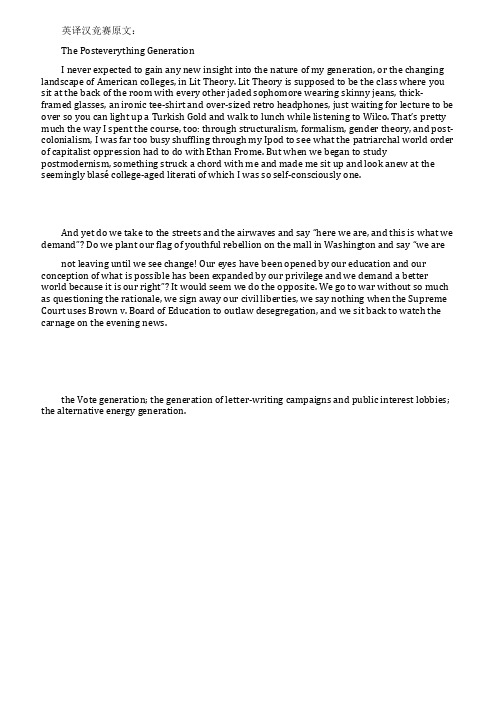
英译汉竞赛原文:The Posteverything GenerationI never expected to gain any new insight into the nature of my generation, or the changing landscape of American colleges, in Lit Theory. Lit Theory is supposed to be the class where you sit at the back of the room with every other jaded sophomore wearing skinny jeans, thick-framed glasses, an ironic tee-shirt and over-sized retro headphones, just waiting for lecture to be over so you can light up a Turkish Gold and walk to lunch while listening to Wilco. That’s pretty much the way I spent the course, too: through structuralism, formalism, gender theory, and post-colonialism, I was far too busy shuffling through my Ipod to see what the patriarchal world order of capitalist oppression had to do with Ethan Frome. But when we began to study postmodernism, something struck a chord with me and made me sit up and look anew at the seemingly blasé college-aged literati of which I was so self-consciously one.And yet do we take to the streets and the airwaves and say “here we are, and this is what we demand”? Do we plant our flag of youthful rebellion on the mall in Washington and say “we are not leaving until we see change! Our eyes have been opened by our education and our conception of what is possible has been expanded by our privilege and we demand a better world because it is our right”? It would seem we do the opposite. We go to war without so much as questioning the rationale, we sign away our civil liberties, we say nothing when the Supreme Court uses Brown v. Board of Education to outlaw desegregation, and we sit back to watch the carnage on the evening news.the Vote generation; the generation of letter-writing campaigns and public interest lobbies; the alternative energy generation.。
历届韩素音翻译大奖赛竞赛原文及译文
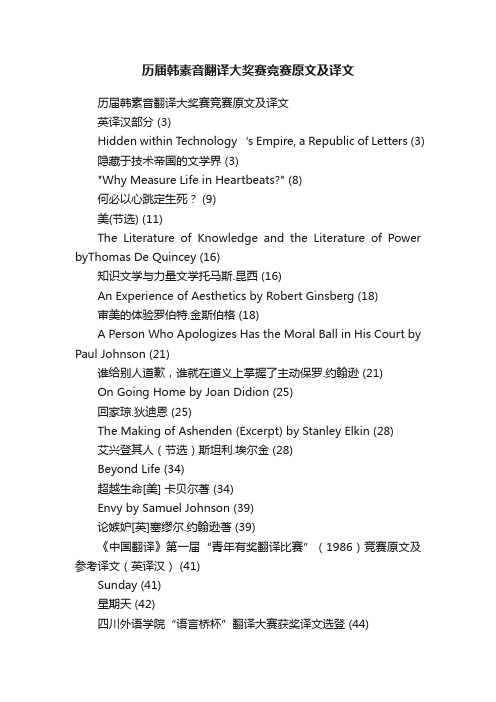
历届韩素音翻译大奖赛竞赛原文及译文历届韩素音翻译大奖赛竞赛原文及译文英译汉部分 (3)Hidden within Technology‘s Empire, a Republic of Letters (3)隐藏于技术帝国的文学界 (3)"Why Measure Life in Heartbeats?" (8)何必以心跳定生死? (9)美(节选) (11)The Literature of Knowledge and the Literature of Power byThomas De Quincey (16)知识文学与力量文学托马斯.昆西 (16)An Experience of Aesthetics by Robert Ginsberg (18)审美的体验罗伯特.金斯伯格 (18)A Person Who Apologizes Has the Moral Ball in His Court by Paul Johnson (21)谁给别人道歉,谁就在道义上掌握了主动保罗.约翰逊 (21)On Going Home by Joan Didion (25)回家琼.狄迪恩 (25)The Making of Ashenden (Excerpt) by Stanley Elkin (28)艾兴登其人(节选)斯坦利.埃尔金 (28)Beyond Life (34)超越生命[美] 卡贝尔著 (34)Envy by Samuel Johnson (39)论嫉妒[英]塞缪尔.约翰逊著 (39)《中国翻译》第一届“青年有奖翻译比赛”(1986)竞赛原文及参考译文(英译汉) (41)Sunday (41)星期天 (42)四川外语学院“语言桥杯”翻译大赛获奖译文选登 (44)第七届“语言桥杯”翻译大赛获奖译文选登 (44)The Woods: A Meditation (Excerpt) (46)林间心语(节选) (47)第六届“语言桥杯”翻译大赛获奖译文选登 (50)第五届“语言桥杯”翻译大赛原文及获奖译文选登 (52)第四届“语言桥杯”翻译大赛原文、参考译文及获奖译文选登 (54) When the Sun Stood Still (54)永恒夏日 (55)CASIO杯翻译竞赛原文及参考译文 (56)第三届竞赛原文及参考译文 (56)Here Is New York (excerpt) (56)这儿是纽约 (58)第四届翻译竞赛原文及参考译文 (61)Reservoir Frogs (Or Places Called Mama's) (61)水库青蛙(又题:妈妈餐馆) (62)中译英部分 (66)蜗居在巷陌的寻常幸福 (66)Simple Happiness of Dwelling in the Back Streets (66)在义与利之外 (69)Beyond Righteousness and Interests (69)读书苦乐杨绛 (72)The Bitter-Sweetness of Reading Yang Jiang (72)想起清华种种王佐良 (74)Reminiscences of Tsinghua Wang Zuoliang (74)歌德之人生启示宗白华 (76)What Goethe's Life Reveals by Zong Baihua (76)怀想那片青草地赵红波 (79)Yearning for That Piece of Green Meadow by Zhao Hongbo (79)可爱的南京 (82)Nanjing the Beloved City (82)霞冰心 (84)The Rosy Cloud byBingxin (84)黎明前的北平 (85)Predawn Peiping (85)老来乐金克木 (86)Delights in Growing Old by Jin Kemu (86)可贵的“他人意识” (89)Calling for an Awareness of Others (89)教孩子相信 (92)To Implant In Our Children‘s Young Hearts An Undying Faith In Humanity (92)心中有爱 (94)Love in Heart (94)英译汉部分Hidden within Technology’s Empire, a Republic of Le tters 隐藏于技术帝国的文学界索尔·贝娄(1)When I was a boy ―discovering literature‖, I used to think how wonderful it would be if every other person on the street were familiar with Proust and Joyce or T. E. Lawrence or Pasternak and Kafka. Later I learned how refractory to high culture the democratic masses were. Lincoln as a young frontiersman read Plutarch, Shakespeare and the Bible. But then he was Lincoln.我还是个“探索文学”的少年时,就经常在想:要是大街上人人都熟悉普鲁斯特和乔伊斯,熟悉T.E.劳伦斯,熟悉帕斯捷尔纳克和卡夫卡,该有多好啊!后来才知道,平民百姓对高雅文化有多排斥。
英语竞赛之翻译篇(一)
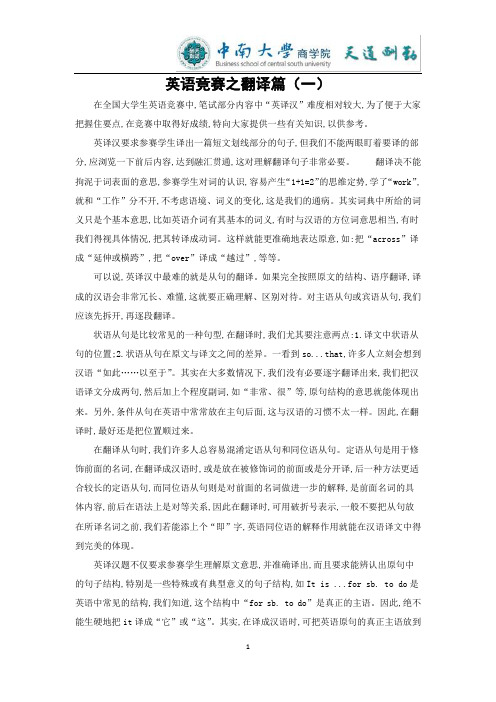
英语竞赛之翻译篇(一)在全国大学生英语竞赛中,笔试部分内容中“英译汉”难度相对较大,为了便于大家把握住要点,在竞赛中取得好成绩,特向大家提供一些有关知识,以供参考。
英译汉要求参赛学生译出一篇短文划线部分的句子,但我们不能两眼盯着要译的部分,应浏览一下前后内容,达到融汇贯通,这对理解翻译句子非常必要。
翻译决不能拘泥于词表面的意思,参赛学生对词的认识,容易产生“1+1=2”的思维定势,学了“work”,就和“工作”分不开,不考虑语境、词义的变化,这是我们的通病。
其实词典中所给的词义只是个基本意思,比如英语介词有其基本的词义,有时与汉语的方位词意思相当,有时我们得视具体情况,把其转译成动词。
这样就能更准确地表达原意,如:把“across”译成“延伸或横跨”,把“over”译成“越过”,等等。
可以说,英译汉中最难的就是从句的翻译。
如果完全按照原文的结构、语序翻译,译成的汉语会非常冗长、难懂,这就要正确理解、区别对待。
对主语从句或宾语从句,我们应该先拆开,再逐段翻译。
状语从句是比较常见的一种句型,在翻译时,我们尤其要注意两点:1.译文中状语从句的位置;2.状语从句在原文与译文之间的差异。
一看到so...that,许多人立刻会想到汉语“如此……以至于”。
其实在大多数情况下,我们没有必要逐字翻译出来,我们把汉语译文分成两句,然后加上个程度副词,如“非常、很”等,原句结构的意思就能体现出来。
另外,条件从句在英语中常常放在主句后面,这与汉语的习惯不太一样。
因此,在翻译时,最好还是把位置顺过来。
在翻译从句时,我们许多人总容易混淆定语从句和同位语从句。
定语从句是用于修饰前面的名词,在翻译成汉语时,或是放在被修饰词的前面或是分开译,后一种方法更适合较长的定语从句,而同位语从句则是对前面的名词做进一步的解释,是前面名词的具体内容,前后在语法上是对等关系,因此在翻译时,可用破折号表示,一般不要把从句放在所译名词之前,我们若能添上个“即”字,英语同位语的解释作用就能在汉语译文中得到完美的体现。
第三届许渊冲翻译大赛汉译英原文

第三届许渊冲翻译大赛汉译英原文[1] 茶和酒是千岁老友,但两人性格绝然相反。
一个是豪爽、狞猛、讲义气的汉子,一个是文静、宽厚、重情谊的书生。
[2] 茶为内功,无喧嚣之形,无激扬之态。
一盏浅注,清流,清气馥郁。
友情缓缓流动,谈兴徐徐舒张。
渐入友朋知己间性灵的深相映照。
[3] 酒为豪狂式的宣泄,茶为含蓄蕴藉式的内向情感。
[4] 酒入大脑,可产生摧毁性的强剌激。
茶具有舒缓的渗透性,潜入全身汗囊毛孔,缓缓生成温馨抚慰效应。
[5] 酒,饮前清香诱人,饮后浊气冲天,污及四邻空气。
茶,饮前淡淡清气,渗透入体,弥漫于不易觉察的周围空间。
[6] 人之或嗜酒,或嗜茶,或兼及双嗜,并非着意选择,更非精心安排。
其所以或癖者,有机缘,也有自然天成。
[7] 我嗜茶数十年,乃缘于出生绿茶之乡。
[8] 家乡小镇,坐落在大别山脚下。
山上山下,酒道不兴,茶道畅行。
毛尖、云雾、瓜片、小兰花,于峰顶、缓坡,漫漫成片。
茶馆,茶叶店,比肩林立。
[9] 幼时生于是乡,壮年又入太湖茶乡,机缘相伴而来。
因之曾种过茶,制过茶,品过茶。
[10] 茶之种,之制,之器,之藏,之饮,各有其术,各有其道,各有其情。
[11] 家乡小镇多茶馆。
外地亲友来访,往往不在家中落座饮茶。
浸泡于茶馆中,清茶,清谈,佐以清蔬淡点。
此似为待客仪规。
视主人钱囊奢、吝,客人风度文、鄙,而开台于雅座或大众厅。
[12] 我幼时,热水瓶属于高档奢侈用品。
普通人家盛茶,多用铜丝把紫砂壶,成提梁紫砂壶。
一壶容量,约相当于五磅热水瓶半瓶或一瓶。
将冲泡好热茶的紫砂壶,放进草编或棕丝编的茶焐中保暖。
考究点的老茶客,手捧巴掌大的小巧紫砂壶。
身边木炭炉上,坐着一把小铜壶,开水源源不绝地冲兑。
[13] 近若干年来,瓷杯、玻璃杯广为普及。
原系大众化的紫砂杯、壶,反而抬举成高档的饮器,更抬举成每件数千元上万元的极高档工艺品。
[14] 茶叶焦干,易碎。
茶叶店中,一桶茶叶卖到将尽时,桶底余茶,往往成了无叶片的茶叶末。
大学生英语竞赛C类翻译专项强化真题试卷3(题后含答案及解析)
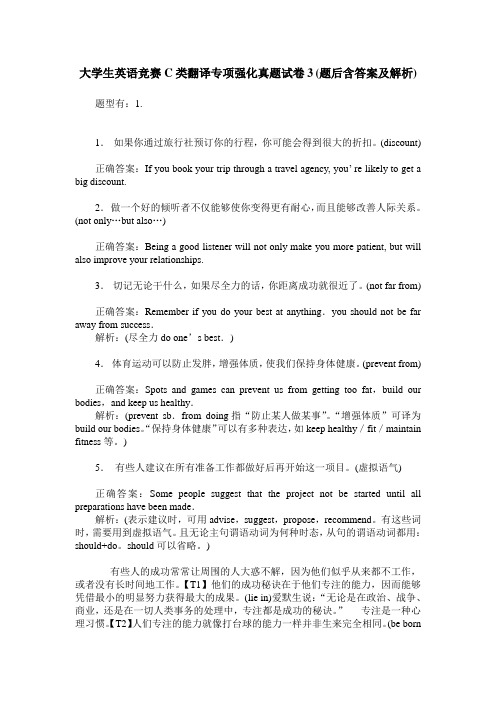
大学生英语竞赛C类翻译专项强化真题试卷3(题后含答案及解析) 题型有:1.1.如果你通过旅行社预订你的行程,你可能会得到很大的折扣。
(discount)正确答案:If you book your trip through a travel agency, you’ re likely to get a big discount.2.做一个好的倾听者不仅能够使你变得更有耐心,而且能够改善人际关系。
(not only…but also…)正确答案:Being a good listener will not only make you more patient, but will also improve your relationships.3.切记无论干什么,如果尽全力的话,你距离成功就很近了。
(not far from)正确答案:Remember if you do your best at anything.you should not be far away from success.解析:(尽全力do one’s best.)4.体育运动可以防止发胖,增强体质,使我们保持身体健康。
(prevent from)正确答案:Spots and games can prevent us from getting too fat,build our bodies,and keep us healthy.解析:(prevent sb.from doing指“防止某人做某事”。
“增强体质”可译为build our bodies。
“保持身体健康”可以有多种表达,如keep healthy/fit/maintain fitness等。
)5.有些人建议在所有准备工作都做好后再开始这一项目。
(虚拟语气)正确答案:Some people suggest that the project not be started until all preparations have been made.解析:(表示建议时,可用advise,suggest,propose,recommend。
广西第二届翻译大赛初赛题目及参考译文
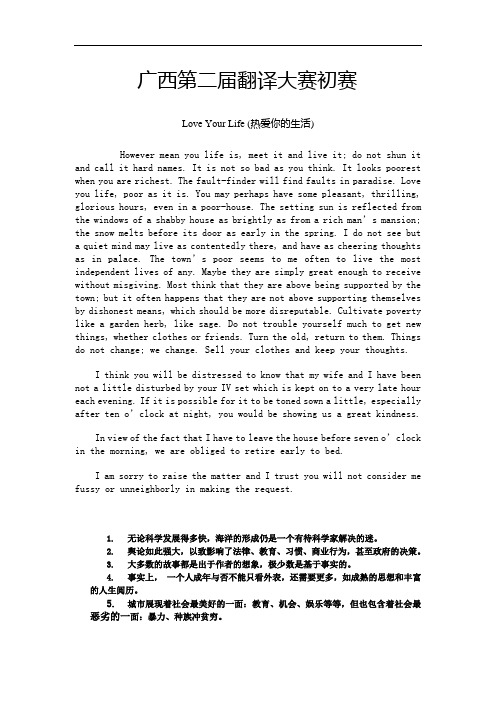
广西第二届翻译大赛初赛Love Your Life (热爱你的生活)However mean you life is, meet it and live it; do not shun it and call it hard names. It is not so bad as you think. It looks poorest when you are richest. The fault-finder will find faults in paradise. Love you life, poor as it is. You may perhaps have some pleasant, thrilling, glorious hours, even in a poor-house. The setting sun is reflected from the windows of a shabby house as brightly as from a rich man’s mansion; the snow melts before its door as early in the spring. I do not see but a quiet mind may live as contentedly there, and have as cheering thoughts as in palace. The town’s poor seems to me often to live the most independent lives of any. Maybe they are simply great enough to receive without misgiving. Most think that they are above being supported by the town; but it often happens that they are not above supporting themselves by dishonest means, which should be more disreputable. Cultivate poverty like a garden herb, like sage. Do not trouble yourself much to get new things, whether clothes or friends. Turn the old, return to them. Things do not change; we change. Sell your clothes and keep your thoughts.I think you will be distressed to know that my wife and I have been not a little disturbed by your IV set which is kept on to a very late hour each evening. If it is possible for it to be toned sown a little, especially after ten o’clock at night, you would be showing us a great kindness.In view of the fact that I have to leave the house before seven o’clock in the morning, we are obliged to retire early to bed.I am sorry to raise the matter and I trust you will not consider me fussy or unneighborly in making the request.1.无论科学发展得多快,海洋的形成仍是一个有待科学家解决的迷。
2022外国语翻译大赛试题及答案
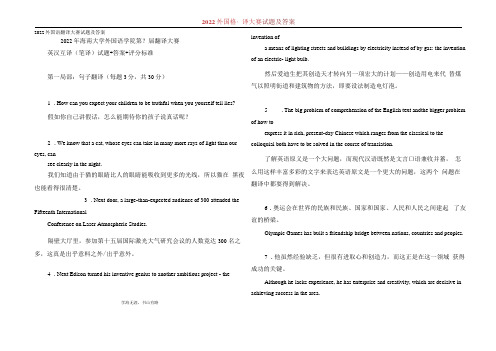
2022外国格・译大赛试题及答案2022外国语翻译大赛试题及答案2022年海南大学外国语学院第?届翻译大赛英汉互译(笔译)试题+答案+评分标准第一局部:句子翻译(每题3分,共30分)1. How can you expect your children to be truthful when you yourself tell lies?假如你自己讲假话,怎么能期待你的孩子说真话呢?2. We know that a cat, whose eyes can take in many more rays of light than our eyes, cansee clearly in the night.我们知道由于猫的眼睛比人的眼睛能吸收到更多的光线,所以猫在黑夜也能看得很清楚。
3. Next door, a large-than-expected audience of 300 attended the Fifteenth InternationalConference on Laser Atmospheric Studies.隔壁大厅里,参加第十五届国际激光大气研究会议的人数竟达300 名之多,这真是出乎意料之外/出乎意外。
4. Next Edison turned his inventive genius to another ambitious project - the invention ofa means of lighting streets and buildings by electricity instead of by gas: the invention of an electric- light bulb.然后爱迪生把其创造天才转向另一项宏大的计划——创造用电来代替煤气以照明街道和建筑物的方法,即要设法制造电灯泡。
5. The big problem of comprehension of the English text andthe bigger problem of how toexpress it in rich, present-day Chinese which ranges from the classical to the colloquial both have to be solved in the course of translation.了解英语原义是一个大问题,而现代汉语既然是文言口语兼收并蓄,怎么用这样丰富多彩的文字来表达英语原文是一个更大的问题,这两个问题在翻译中都耍得到解决。
初中5、6册文言文句子翻译竞赛题

22、利尽南海,东连吴会, 西通巴、蜀,此用武之国。
答案:
一直到南海的物资都能得到, 东面连着吴郡和会稽郡,西面 直通巴郡蜀郡,这是用兵之地。
23、不宜妄自菲薄,引喻失义, 以塞忠谏之路。
答案:
不应该随便地看轻自己, 说话不恰当,以致堵塞了 忠诚进谏的道路。
24、此悉贞良死节之臣。
答案:
这些都是坚贞可靠、能够以 死报国的忠臣。
答案: 精神凝聚安定,形体得到解脱, 和万物的变化暗暗相合。
12、入则无法家拂士,出则 无敌国外患者,国恒亡。
答案:
国内如果没有有法度的世臣和足以 辅佐君主的贤士,国外如果没有敌 对的国家和外来的忧患,那么,这 样的国家常常容易灭亡。
13、去国怀乡,忧谗畏讥
答案:
离开国都怀念家乡,担心人家说坏话,惧怕人家批评指责
答案: 山势回环,路也跟着拐弯。有个亭 子四角翘起,像鸟张开翅膀一样, 高踞在泉水上边,那是醉翁亭。
3、尺寸千里,攒蹙累积,莫得遁 隐。
答案:
虽隔千里之遥却如在尺寸之间, 聚集收拢,重叠到一起,没有 能从我的视线里逃脱隐蔽的。
4、醉翁之意不在酒,在乎山水之间也。 答案:
醉翁的情趣不在喝酒上,而在 于山水之间。
25、然文不可以学而能,气可以 养而致。
答案:
然而,如不先养气,只是学作 文,文章是写不好的。气可以 通过修养获得。
26、先帝不以臣卑鄙,猥自 枉屈,三顾臣于草庐之中。
答案:
先帝不因我身份低微,出身鄙 野,降低身份,委屈自己,三 次到草庐之中来拜访我。
27、百姓孰敢不箪食壶 浆以迎将军者乎?
答案:
8、悠悠乎与颢气俱,而莫 得其涯 答案:
我的身心悠悠然与天地之气 融为一体,而不知道它的边 际。
英语世界翻译竞赛原文
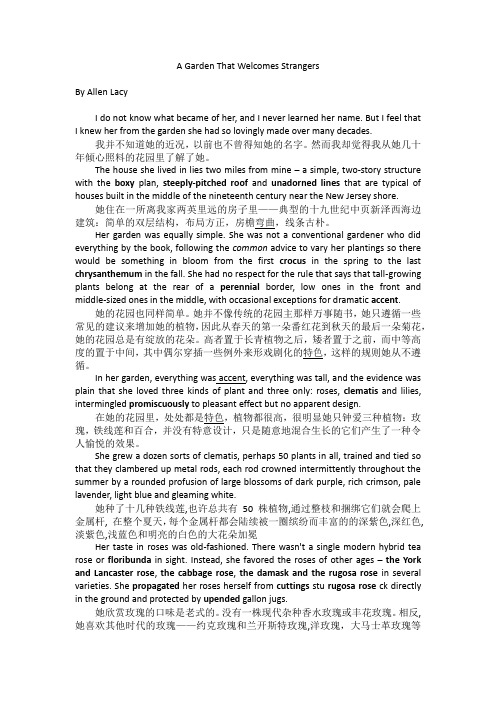
A Garden That Welcomes StrangersBy Allen LacyI do not know what became of her, and I never learned her name. But I feel that I knew her from the garden she had so lovingly made over many decades.我并不知道她的近况,以前也不曾得知她的名字。
然而我却觉得我从她几十年倾心照料的花园里了解了她。
The house she lived in lies two miles from mine – a simple, two-story structure with the boxy plan,steeply-pitched roof and unadorned lines that are typical of houses built in the middle of the nineteenth century near the New Jersey shore.她住在一所离我家两英里远的房子里——典型的十九世纪中页新泽西海边建筑:简单的双层结构,布局方正,房檐弯曲,线条古朴。
Her garden was equally simple. She was not a conventional gardener who did everything by the book, following the common advice to vary her plantings so there would be something in bloom from the first crocus in the spring to the last chrysanthemum in the fall. She had no respect for the rule that says that tall-growing plants belong at the rear of a perennial border, low ones in the front and middle-sized ones in the middle, with occasional exceptions for dramatic accent.她的花园也同样简单。
第23届韩素音青年翻译奖竞赛汉译英原文
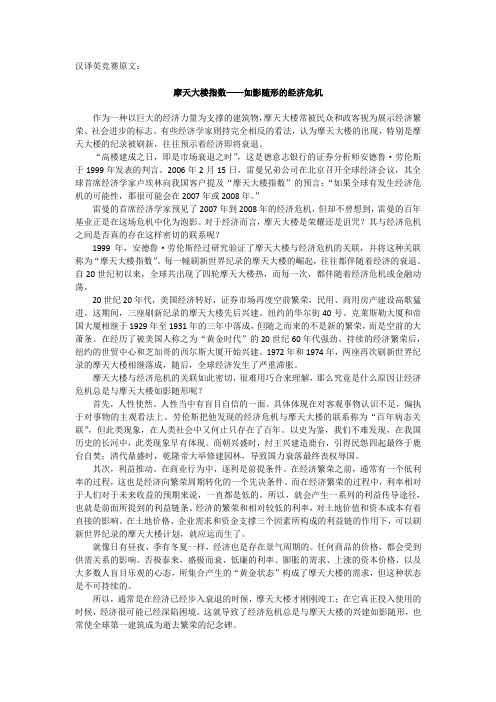
汉译英竞赛原文:摩天大楼指数——如影随形的经济危机作为一种以巨大的经济力量为支撑的建筑物,摩天大楼常被民众和政客视为展示经济繁荣、社会进步的标志。
有些经济学家则持完全相反的看法,认为摩天大楼的出现,特别是摩天大楼的纪录被刷新,往往预示着经济即将衰退。
“高楼建成之日,即是市场衰退之时”,这是德意志银行的证券分析师安德鲁·劳伦斯于1999年发表的判言。
2006年2月15日,雷曼兄弟公司在北京召开全球经济会议,其全球首席经济学家卢埃林向我国客户提及“摩天大楼指数”的预言:“如果全球有发生经济危机的可能性,那很可能会在2007年或2008年。
”雷曼的首席经济学家预见了2007年到2008年的经济危机,但却不曾想到,雷曼的百年基业正是在这场危机中化为泡影。
对于经济而言,摩天大楼是荣耀还是诅咒?其与经济危机之间是否真的存在这样密切的联系呢?1999年,安德鲁·劳伦斯经过研究验证了摩天大楼与经济危机的关联,并将这种关联称为“摩天大楼指数”。
每一幢刷新世界纪录的摩天大楼的崛起,往往都伴随着经济的衰退。
自20世纪初以来,全球共出现了四轮摩天大楼热,而每一次,都伴随着经济危机或金融动荡。
20世纪20年代,美国经济转好,证券市场再度空前繁荣,民用、商用房产建设高歌猛进。
这期间,三座刷新纪录的摩天大楼先后兴建。
纽约的华尔街40号、克莱斯勒大厦和帝国大厦相继于1929年至1931年的三年中落成,但随之而来的不是新的繁荣,而是空前的大萧条。
在经历了被美国人称之为“黄金时代”的20世纪60年代强劲、持续的经济繁荣后,纽约的世贸中心和芝加哥的西尔斯大厦开始兴建。
1972年和1974年,两座再次刷新世界纪录的摩天大楼相继落成,随后,全球经济发生了严重滞胀。
摩天大楼与经济危机的关联如此密切,很难用巧合来理解,那么究竟是什么原因让经济危机总是与摩天大楼如影随形呢?首先,人性使然。
人性当中有盲目自信的一面。
具体体现在对客观事物认识不足,偏执于对事物的主观看法上。
江西省第七届英语翻译大赛决赛试题及参考答案

江西省第七届英语翻译大赛决赛试题及参考答案江西省第七届英语翻译大赛决赛I. 英译中It was a cold grey day in late November. The weather had changed overnight, when a backing wind brought a granite sky and a mizzling rain with it, and although it was now only a little after two o’clock in the afternoon the pallour of a winter evening seemed to have closed upon the hills, cloaking them in mist. It would be dark by four. The air was clammy cold, and for all the tightly closed windows it penetrated the interior of the coach. The leather seats felt damp to the hands, and there must have been a small crack in the roof, because now and again little drips of rain fell softly through, smudging the leather and leaving a dark blue stain like a splodge of ink. The wind came in gusts, at times shaking the coach as it travelled round the bend of the road, and in the exposed places on the high ground it blew with such force that the whole body of the coach trembled and swayed, rocking between the high wheels like a drunken man.The driver, muffled in a greatcoat to his ears, bent almost double in his seat, in a faint endeavour to gain shelter from his own shoulders, while the dispirited horses plodded sullenly to his command, too broken by the wind and the rain to feel the whip that now and again cracked above their heads, while it swung between the numb fingers of the driver.The wheels of the coach creaked and groaned as they sank onto the ruts on the road, and sometimes they flung up the soft spattered mud against the windows, where it mingled with the constant driving rain, and whatever view there might have been of the countryside was hopelessly obscured.The few passengers huddled together for warmth, exclaiming in unison when the coach sank into a heavier rut than usual, and one old fellow, who had kept up a constant complaint ever since he had joined the coach at Truro, rose from his seat in a fury, and, fumbling with the window sash, let the window down with a crash, bringing a shower of rain in upon himself and his fellow passengers. He thrust his head out and shouted up to the driver, cursing him in a high petulant voice for a rogue and a murderer; that they would all be dead before they reached Bodmin if he persisted in driving at breakneck speed; they had no breath left in their bodies as it was, and he for one would never travel by coach again.II. 中译英艰难的国运与雄健的国民李大钊历史的道路,不会是坦平的,有时走到艰难险阻的境界。
翻译大赛试题.

2012年三峡大学英语翻译比赛考试Congratulations to you !!I.英译汉一.翻译句子。
下面每个英语句子均有3个汉语译文(分别标为A,B,C),请选择你认为的最好译文。
(每题2分,共20分)1.When it came to reading, they were as good as blind.A.来读书时,他们和瞎子一样好。
B.一拿起书本,他们可都成了睁眼瞎了。
C.说到读书,他们可都是瞎子。
D.当读书时,他们比瞎子要好。
2.They did not reopen the Pandora’s Box they had peeked into in 1972.A.他们在1972年曾挖掘过这些丑事了,如今却不要开这个潘多拉的盒子。
B.他们没有再次打开他们1972年曾经偷看过的这只潘多拉的盒子。
C.他们现在不会再打开1972年就曾探知的潘多拉盒子了。
D.他们1972年就曾探知这个潘多拉盒子,现在不再揭露这些丑事了。
3.The United Nations is no stronger than the collective will of the nations that support it.A.联合国没有支持它的各成员国的集体意志强大。
B.联合国跟支持它的各成员国的集体意志一样强大。
C.联合国的强大程度取决于各成员国的集体意志对它支持的程度。
D.联合国的作用依靠其成员国集体意志的支持,否则它不会有什么力量。
4.In some poverty-stricken areas now, not a few people are found failing to achieve food security.A.现在在一些贫困地区,还有相当多的人被发现未达到食物安全。
B.现在在一些贫困地区,许多人的食物还没有保障。
C.现在在一些贫困地区,相当数量的人还没有解决温饱问题。
D.现在在一些贫困地区,没有太多人还没有解决温饱问题。
中英互译比赛个人赛题目
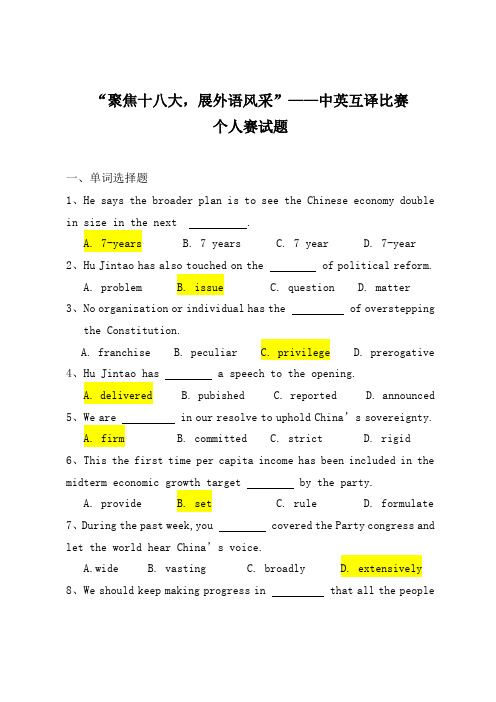
“聚焦十八大,展外语风采”——中英互译比赛个人赛试题一、单词选择题1、He says the broader plan is to see the Chinese economy double in size in the next .A. 7-yearsB. 7 yearsC. 7 yearD. 7-year2、Hu Jintao has also touched on the of political reform.A. problemB. issueC. questionD. matter3、No organization or individual has the of oversteppingthe Constitution.A. franchiseB. peculiarC. privilegeD. prerogative4、Hu Jintao has a speech to the opening.A. deliveredB. pubishedC. reportedD. announced 5our resolve to uphold China’s sovereignty.6、This the first time per capita income has been included in the midterm economic growth target by the party.A. provideB. setC. ruleD. formulate7、During the past week,you covered the Party congress and let the world hear China’s voice.A.wideB. vastingC. broadlyD. extensively8、We should keep making progress in that all the peopleenjoy their rights to education , employment , medical and old-age care , and housing so that they will lead a better life.A. ensuringB. engagingC. guaranteeD. assure9、We will strive to be of their trust and fulfill our mission.A. worthyB. worthC. worth-whileD. worthing10、China hegemonism and power politics in all their forms and will never seek hegemony or engage in expansion.A. objectsB. againstsC. combatD. opposes11、China will unswervingly follow the path of peaceful development12、If we fail to handle this issue well,it could prove to the party.A. harnB. destructiveC. fatalD.dissolving13、They should both exercise strict and strengthen education and supervision over their families and their staff.A.self-disciplineB.self-egoC.self-centeredD.self-control14、It has rallied and led the Chinese people in ______the poor and backward Old China into an increasingly prosperous and powerful New China.A. transformingB. influencingC. fashioningD. varing15、However, we will never_____a Western political system.A. copyB. referenceC. consultD. learn16、China is committed to peaceful settlement of internation_________and hotspot issue.A. arguesB. debatesC. disputesD. contends17、Taking economic development as the central task is ________tonation renewal.A. vitalB. importantC. significantD. crucial18、Our overall approach is to ___________ economic, political, cultural, social, and ecological progress.A. facilitateB. boostC. promoteD. prefer19、We should give high________ to rural areas in developing infrastructure and social programs in the country.A. priorityB. precedenceC. undelyingD. backward20、To complete the building of a moderately prosperous society inall _________ , we must with greater political courage and vision.A. respectsB. sidesC. wayD. field21、During the long course of history , they a beautiful homeland.A. initiatedB. createdC. opened upD. started22、Our responsibility is weightier than Mount Tai , and our journey is long arduons.A. forwardB. onwardC. aheadD. prorsal23、To meet their desire for a happy life is our .A. missionB. hopeC. wishD. want24、China ______ hegemonism and power politics in all their forms and will never seek hegemony or engage in expansion.A. opposesB. opposeC. is againstD. object to25、We have taken on this important _______ for the Party. Our Party is dedicated to serving the people.A. responsibilityB. diutyC. responsableD. blame二、短语选择题1、____ provides now scientific answers to the major questions of what kind of development China should achieve in a new environment.A. Scientific insight on developmentB. Scientific outlook on developmentC. Scientific eyes on developmentD. Scientific vision on development2、We should attain the goal of completing the building of a __________ in all respects by 2020.A. moderately flourish societyB. moderately prosperous societyC. contemporary prosperous societyD. moderately booming society3、 China remains in a period of ________ for its development, a period in which much can be achieved.A. strategic opportunitiesB. strategic opportunitieC. strategic chancesD. strategic chance4、Taking _________ as the central task is vital to national renenal.A. cultural developmentB. economic developmentC. environment developmentD. technology development5、 We should formally maintain the strategic focus of __________.A. decrease foreign demandB. boosting foreign demandC. decrease domestic demandD. boosting domestic demand6、Speed up the establishment of a long-term mechanism to __________.A. increase consumer demandB. increase production demandC. decrease consumer demandD. decrease production demand7、Increase investment at a proper pace, and ___________.A. expand the foreign marketB. reduce the foreign marketC. expand the domestic marketD. reduce the domestic market8、We will insist on political structure reform , and never copya/an ____.A. Eastern political systemB. Western economical systemC. Western political systemD. Northern political system9、We have ___ this responsibility for the party.A. taken offB. taken downC. taken onD. taken up10、The whole party must ____ full alert.A. stay onB. keep onC. stay awayD. keep away on11、We have every reason to ____ in these achievements.A. play role inB. take pride inC. thought shameD. take down12、Numerous Chinese patriots ___.A. rose upB. rose downC. rose offD. rose in13、______is "to be the first, pragmatic and enterprising, open compatible, professional dedication," the spirit of.New period guangdong spirit "thick morality, faithfulness to the letter, swift line"A. Cantonese spiritB. Cantonese mindC. Cantonese essenceD. Cantonese vigour14、Together with Marxism-Leninism, Mao Zedong Thought, Deng Xiaoping Theory and the important thought of Three Represents, the Scientific Outlook on Development is the ______ the Party must adhere to for a long time.A. theoretical directB. theoretical guidanceC. theoretical guideD. theoretical direction15、Wang Yang:in citizen ___and mass culture refining "guangdong spirit"A. moral costB. moral worthC. moral valueD. moral valuable。
英语翻译大赛平时积累
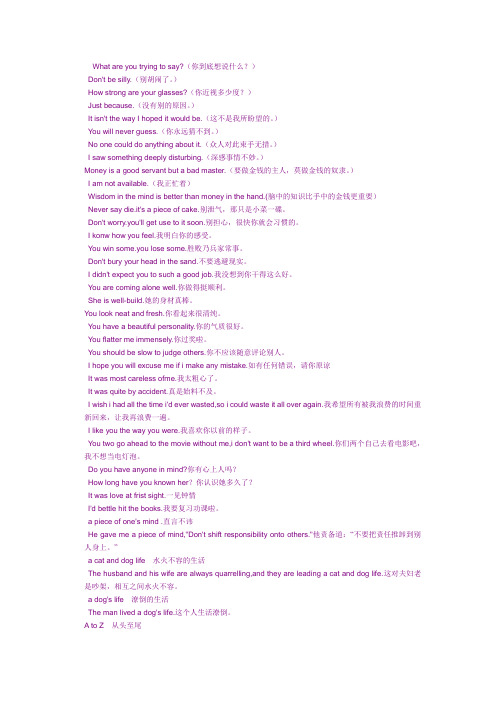
What are you trying to say?(你到底想说什么?)Don't be silly.(别胡闹了。
)How strong are your glasses?(你近视多少度?)Just because.(没有别的原因。
)It isn't the way I hoped it would be.(这不是我所盼望的。
)Y ou will never guess.(你永远猜不到。
)No one could do anything about it.(众人对此束手无措。
)I saw something deeply disturbing.(深感事情不妙。
)Money is a good servant but a bad master.(要做金钱的主人,莫做金钱的奴隶。
)I am not available.(我正忙着)Wisdom in the mind is better than money in the hand.(脑中的知识比手中的金钱更重要)Never say die.it's a piece of cake.别泄气,那只是小菜一碟。
Don't worry.you'll get use to it soon.别担心,很快你就会习惯的。
I konw how you feel.我明白你的感受。
Y ou win some.you lose some.胜败乃兵家常事。
Don't bury your head in the sand.不要逃避现实。
I didn't expect you to such a good job.我没想到你干得这么好。
Y ou are coming alone well.你做得挺顺利。
She is well-build.她的身材真棒。
Y ou look neat and fresh.你看起来很清纯。
Y ou have a beautiful personality.你的气质很好。
第九届河南省翻译竞赛试题及参考译文-专科组-附分值

第九届河南省翻译竞赛试题——专科组I. Translate the Following Passage into Chinese. (50 Points)A superstition is a belief people hold which is not based on reason. There is no logic to superstitions. These beliefs often go against the laws of nature as we know them. People who have superstitions, or who are superstitious, believe that they can either bring themselves good luck or avoid bad luck or disasters by acting in certain ways. An example of this involves salt. When some people spill salt, they immediately take some of it and throw it over their left shoulder. In this way, they feel they will avoid bad luck.Why do people believe in superstitions? How did they begin to think that they could control their luck?People in ancient times believed that the gods controlled their lives and all of nature. They tried to keep their gods happy by giving them gifts. When there were natural disasters, people thought that the gods were angry with them, so they tried to make the gods happy again.Many superstitions have been held by people for centuries. Yet there is little need for them today, since people in most parts of the world don’t believe that there are a lot of gods.We no longer try to make the gods happy with gifts or to keep them from anger with certain actions. Somehow, however, many of the actions continue in modern times. We still have our superstitions.In ancient times, people thought their gods lived on the tops of mountains. They therefore believed that anything above them was nearer to their gods than they. Naturally, they thought that birds were messengers from the gods. People also believed that birds carried their souls to the gods when they died.II. Translate the Following Passage into English. (50 Points)小时候我害怕狗。
英语翻译句子的练习题
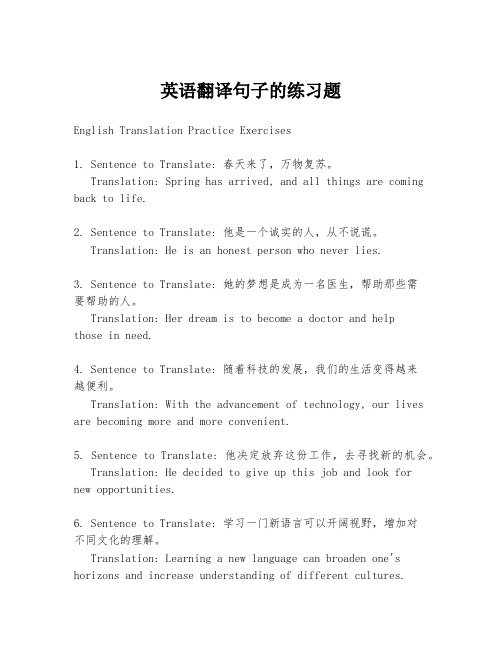
英语翻译句子的练习题English Translation Practice Exercises1. Sentence to Translate: 春天来了,万物复苏。
Translation: Spring has arrived, and all things are coming back to life.2. Sentence to Translate: 他是一个诚实的人,从不说谎。
Translation: He is an honest person who never lies.3. Sentence to Translate: 她的梦想是成为一名医生,帮助那些需要帮助的人。
Translation: Her dream is to become a doctor and helpthose in need.4. Sentence to Translate: 随着科技的发展,我们的生活变得越来越便利。
Translation: With the advancement of technology, our lives are becoming more and more convenient.5. Sentence to Translate: 他决定放弃这份工作,去寻找新的机会。
Translation: He decided to give up this job and look for new opportunities.6. Sentence to Translate: 学习一门新语言可以开阔视野,增加对不同文化的理解。
Translation: Learning a new language can broaden one's horizons and increase understanding of different cultures.7. Sentence to Translate: 这个项目的成功取决于团队成员之间的合作。
高中汉译英试

高中汉译英试————————————————————————————————作者:————————————————————————————————日期:翻译练习1.那时他没有意识到发生了什么事情。
(be aware)2.站在陌生人面前时,她不敢大声说好话。
(dare)3.我们要求酒后驾车的人必须受到严厉的惩罚。
(demand v)4.我的故乡变化之大,超乎了我的预期。
(so…that)5.飞机上的任何人都几乎没有从这次空难中侥幸存活的可能。
(survive)6.既然你的英语很棒,你就应该在谋职时充分利用你的语言优势。
(make use of)7.坏习惯一旦被养成了就很难被戒除。
(Once)8.很难找到像Albert Einstein一样伟大的科学家。
(as…as)9.毫无疑问,金钱有用但不是万能的。
(doubt n)10.我喜欢购买一些值得反复阅读的好书籍。
(worth)11.他讲英语特别流利,好像他是在英国长大的。
(as if)12.我希望学生们都能在接下来的一年里不遗余力地学习各门功课。
(spare v)13.他送给妈妈一朵康乃馨(carnation)作为母亲节的礼物。
(as prep)14.我不知道你能否让我用一下你的电脑。
(wonder v)15.未经深思熟虑,他不会做出任何决定的。
(without)16.一天到晚,他总是命令别人该干什么。
(order v)17.令我倍感欣慰的是,我的亲戚、朋友在那次地震中都没有受伤。
(relief)18.她没有参加演讲比赛,这使她失去了一个锻炼英语口语的机会。
(非限制性定语从句)19.很快你就会习惯戴眼镜的。
(before)20.不尊重别人的人不能指望别人尊重他们。
(expect)21.不管你多么聪明,不努力就不会成功。
(However)22.当她见到寻找了多年的姐姐时,忍不住哭了起来。
(help v)23.教室足够大,可以容纳下比你预料的还要多的学生。
第十三届沪江杯翻译竞赛英语组原文及获奖译文

第十三届“沪江杯”翻译竞赛原文(英语组)Reading(excerpt)The Writer in WinterJohn Updike YOUNG OR OLD,a writer sends a book into the world,not himself.There is no Senior Tour for authors,with the tees shortened by twenty yards and carts allowed. No mercy is extended by the reviewers;but,then,it is not extended to the rookie writer,either.He or she may feel,as the gray-haired scribes of the day continue to take up space and consume the oxygen in the increasingly small room of the print world,that the elderly have the edge,with their established names and already secured honors.How we did adore and envy them,the idols of our college years—Hemingway and Faulkner,Frost and Eliot,Mary McCarthy and Flannery O’Connor and Eudora Welty!We imagined them aswim in a heavenly refulgence,as joyful and immutable in their exalted condition as angels forever singing.Now that I am their age—indeed,older than a number of them got to be—I can appreciate the advantages,for a writer,of youth and obscurity.You are not yet typecast.You can take a distant,cold view of the entire literary scene.You are full of your material—your family,your friends,your region of the country,your generation—when it is fresh and seems urgently worth communicating to readers.No amount of learned skills can substitute for the feeling of having a lot to say,of bringing news.Memories,impressions,and emotions from your first twenty years on earth are most writers’main material;little that comes afterward is quite so rich and resonant.By the age of forty,you have probably mined the purest veins of this precious lode;after that,continued creativity is a matter of sifting the leavings.You become playful and theoretical;you invent sequels,and attempt historical novels.The novels and stories thus generated may be more polished,more ingenious,even more humane than their predecessors;but none does quite the essential earthmoving work that Hawthorne,a writer who dwelt in the shadowland“where the Actual and the Imaginary may meet,”specified when he praised the novels of Anthony Trollope asbeing“as real as if some giant had hewn a great lump out of the earth and put it under a glass case.”This second quotation—one writer admiring a virtue he couldn’t claim—meant a lot to me when I first met it,and I have cited it before.A few images,a few memorable acquaintances,a few cherished phrases circle around the aging writer’s head like gnats as he strolls through the summertime woods at gloaming.He sits down before the word processor’s humming,expectant screen,facing the strong possibility that he has already expressed what he is struggling to express again.My word processor—a term that describes me as well—is the last of a series of instruments of self-expression that began with crayons and colored pencils held in my childish fist.My hands,somewhat grown,migrated to the keyboard of my mother’s typewriter,a portable Remington,and then,schooled in touch-typing,to my own machine,a beige Smith Corona expressly bought by loving parents for me to take to college.I graduated to an office model,on the premises of The New Yorker,that rose up,with an exciting heave,from the surface of a metal desk.Back in New England as a freelancer,I invested in an electric typewriter that snatched the letters from my fingertips with a sharp,premature clack;it held,as well as a black ribbon,a white one with which I could correct my many errors.Before long,this clever mechanism gave way to an even more highly evolved device,an early Wang word processor that did the typing itself,with a marvellous speed and infallibility.My next machine,an IBM, made the Wang seem slow and clunky and has been in turn superseded by a Dell that deals in dozens of type fonts and has a built-in spell checker.Through all this relentlessly advancing technology the same brain gropes through its diminishing neurons for images and narratives that will lift lumps out of the earth and put them under the glass case of published print.With ominous frequency,I can’t think of the right word.I know there is a word;I can visualize the exact shape it occupies in the jigsaw puzzle of the English language. But the word itself,with its precise edges and unique tint of meaning,hangs on the misty rim of consciousness.Eventually,with shamefaced recourse to my well-thumbed thesaurus or to a germane encyclopedia article,I may pin the worddown,only to discover that it unfortunately rhymes with the adjoining word of the sentence.Meanwhile,I have lost the rhythm and syntax of the thought I was shaping up,and the paragraph has skidded off(like this one)in an unforeseen direction.When,against my better judgment,I glance back at my prose from twenty or thirty years ago,the quality I admire and fear to have lost is its carefree bounce,its snap,its exuberant air of slight excess.The author,in his boyish innocence,is calling, like the sorcerer’s apprentice,upon unseen powers—the prodigious potential of this flexible language’s vast vocabulary.Prose should have a flow,the forward momentum of a certain energized weight;it should feel like a voice tumbling into your ear.An aging writer wonders if he has lost the ability to visualize a completed work, in its complex spatial relations.He should have in hand a provocative beginning and an ending that will feel inevitable.Instead,he may arrive at his ending nonplussed, the arc of his intended tale lying behind him in fragments.The threads have failed to knit.The leap of faith with which every narrative begins has landed him not on a far safe shore but in the middle of the drink.The failure to make final sense is more noticeable in a writer like Agatha Christie,whose last mysteries don’t quite solve all their puzzles,than in a broad-purposed visionary like Iris Murdoch,for whom puzzlement is part of the human condition.But in even the most sprawling narrative, things must add up.The ability to fill in a design is almost athletic,requiring endurance and agility and drawing upon some of the same mental muscles that develop early in mathematicians and musicians.Though writing,being partly a function of experience, has few truly precocious practitioners,early success and burnout are a dismally familiar American pattern.The mental muscles slacken,that first freshness fades.In my own experience,diligent as I have been,the early works remain the ones I am best known by,and the ones to which my later works are unfavorably compared.Among the rivals besetting an aging writer is his younger,nimbler self,when he was the cocky new thing.From the middle of my teens I submitted drawings,poems,and stories to The New Yorker;all came back with the same elegantly terse printed rejection slip.Myfirst break came late in my college career,when a short story that I had based on my grandmother’s slow dying of Parkinson’s disease was returned with a note scrawled in pencil at the bottom of the rejection slip.It read,if my failing memory serves:“Look—we don’t use stories of senility,but try us again.”Now“stories of senility”are about the only ones I have to tell.My only new experience is of aging,and not even the aged much want to read about it.We want to read,judging from the fiction that is printed,about life in full tide,in love or at war—bulletins from the active battlefields,the wretched childhoods,the poignant courtships,the fraught adulteries,the big deals,the scandals,the crises of sexually and professionally active adults.My first published novel was about old people;my hero was a ninety-year-old man.Having lived as a child with aging grandparents,I imagined old age with more vigor,color,and curiosity than I could bring to a description of it now.I don’t mean to complain.Old age treats free-lance writers pretty gently.There is no compulsory retirement at the office,and no athletic injuries signal that the game is over for good.Even with modern conditioning,a ballplayer can’t stretch his career much past forty,and at the same age an actress must yield the romantic lead to a younger woman.A writer’s fan base,unlike that of a rock star,is post-adolescent,and relatively tolerant of time’s scars;it distressed me to read of some teenager who, subjected to the Rolling Stones’halftime entertainment at a recent Super Bowl, wondered why that skinny old man(Mick Jagger)kept taking his shirt off and jumping around.The literary critics who coped with Hemingway’s later,bare-chested novel Across the River and Into the Trees asked much the same thing.By and large,time moves with merciful slowness in the old-fashioned world of writing.The eighty-eight-year-old Doris Lessing won the Nobel Prize in Literature. Elmore Leonard and P.D.James continue,into their eighties,to produce best-selling thrillers.Although books circulate ever more swiftly through the bookstores and back to the publisher again,the rhythms of readers are leisurely.They spread recommendations by word of mouth and“get around”to titles and authors years after making a mental note of them.A movie has a few weeks to find its audience,andtelevision shows flit by in an hour,but books physically endure,in public and private libraries,for generations.Buried reputations,like Melville’s,resurface in academia; avant-garde worthies such as Cormac McCarthy attain,late in life,best-seller lists and The Oprah Winfrey Show.A pervasive unpredictability lends hope to even the most superannuated competitor in the literary field.There is more than one measurement of success.A slender poetry volume selling fewer than a thousand copies and receiving a handful of admiring reviews can give its author a pride and sense of achievement denied more mercenary producers of the written word.As for bad reviews and poor sales,they can be dismissed on the irrefutable hypothesis that reviewers and book buyers are too obtuse to appreciate true excellence.Over time,many books quickly bloom and then vanish;a precious few unfold,petal by petal,and become classics.An aging writer has the not insignificant satisfaction of a shelf of books behind him that,as they wait for their ideal readers to discover them,will outlast him for a while.The pleasures,for him,of bookmaking—the first flush of inspiration,the patient months of research and plotting,the laserprinted final draft,the back-and-forthing with Big Apple publishers,the sample pages,the jacket sketches, the proofs,and at last the boxes from the printers,with their sweet heft and smell of binding glue—remain,and retain creation’s giddy bliss.Among those diminishing neurons there lurks the irrational hope that the last book might be the best.第十三届“沪江杯”翻译竞赛获奖译文(英语组)作家入冬陈以侃译作家不管岁数大小,送入世界的总是一本书,而不是他自己。
- 1、下载文档前请自行甄别文档内容的完整性,平台不提供额外的编辑、内容补充、找答案等附加服务。
- 2、"仅部分预览"的文档,不可在线预览部分如存在完整性等问题,可反馈申请退款(可完整预览的文档不适用该条件!)。
- 3、如文档侵犯您的权益,请联系客服反馈,我们会尽快为您处理(人工客服工作时间:9:00-18:30)。
1.我会踢足球和弹钢琴。
I can play football and the piano.
2.这周末去游泳吗?
How about going swimming this weekend?
3.桌子上有苹果吗?不,没有。
Are there any apples on the table? No, there aren’t.
4.瓶子里有水吗?
Is there any water in the bottle?
5.你们班上有多少学生?
How many students are there in your class?
6. 教室里有多少学生?
How many students are there in the classroom?
7. 我们学校没有图书馆。
There aren’t any libraries in our school.
8. 在玛丽的班里有40名学生。
There are 40 students in Mary’s class.
9.我们学校有一个体育馆,两个图书馆和三个餐厅。
There is a gym, two libraries and three dining halls in our school.
10.吃太多的肉对孩子们不好。
Eating too much meat is bad for children.
11.每天早上吃早餐很重要。
It’s important to have breakfast every morning.
12.假期去公园里野餐好吗?
How about having a picnic in the park?
13. 多吃蔬菜和水果对你的健康有好处。
It is good for your health to eat more vegetables and fruit.
14. 吃太多的巧克力对你的健康有害。
It is bad for your health to eat too much chocolate.
15. 对于学生而言,努力学好英语是非常重要的。
It is very important for students to stud English hard.
16.. 我喜欢地理而且我地理学得不错。
I like geography and I am good at it.
17.. 老虎擅长游泳,但不会爬树。
The tiger is good at swimming but it can't climb trees.
18.. 母亲节,我经常给妈妈寄一些礼物。
On Mother's Day, I often send my mother some gifts.
On Mother's Day, I often send some gifts to my mother.
19.. 汤姆上学从不迟到。
Tom is never late for school.
20. 我很高兴收到你的来信,但是我恐怕不能参加你们的婚礼了。
I’m very happy to hear from you, but I’m afraid I can’t go to your wedding.
21.. 你愿意来参加我的生日聚会吗?是的,我愿意。
Would you like to come to my birthday party? Yes, I’d love to.
22. 她花很多钱买书。
She spends a lot of money on books. She spends a lot of money buying books.
23.. 我想喝一杯加糖的咖啡。
I would like a cup of coffee with sugar.
24. 周六汤姆喜欢待在家里看电视。
Tome likes staying at home and watching television on Saturday.
25. 晚上睡觉前,我们应该向爸爸妈妈道声晚安。
We should say good night to our parents before we go to bed.
26. 他们正玩得很愉快。
They are having a good time.
27. 我们在照很多照片。
We are taking a lot of photos.
28. 感谢你从美国寄给我的明信片。
Thank you for your postcard form America.
29. 快点!我们上课要迟到啦!
Hurry up! We will be late for the class.
30. 你应该把书收拾整理好。
You should put away the books.
31. 你们在为期末考试做准备吗?
Are you getting ready for the final exam?
32. 此刻,我们正在为春节做准备。
At the moment, they are busy getting ready for spring festival. .。
